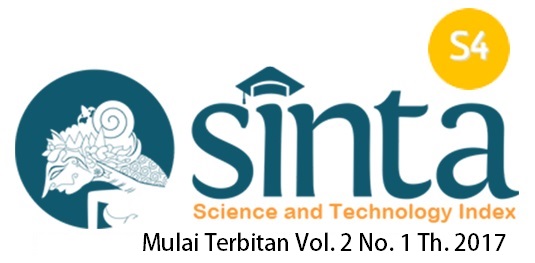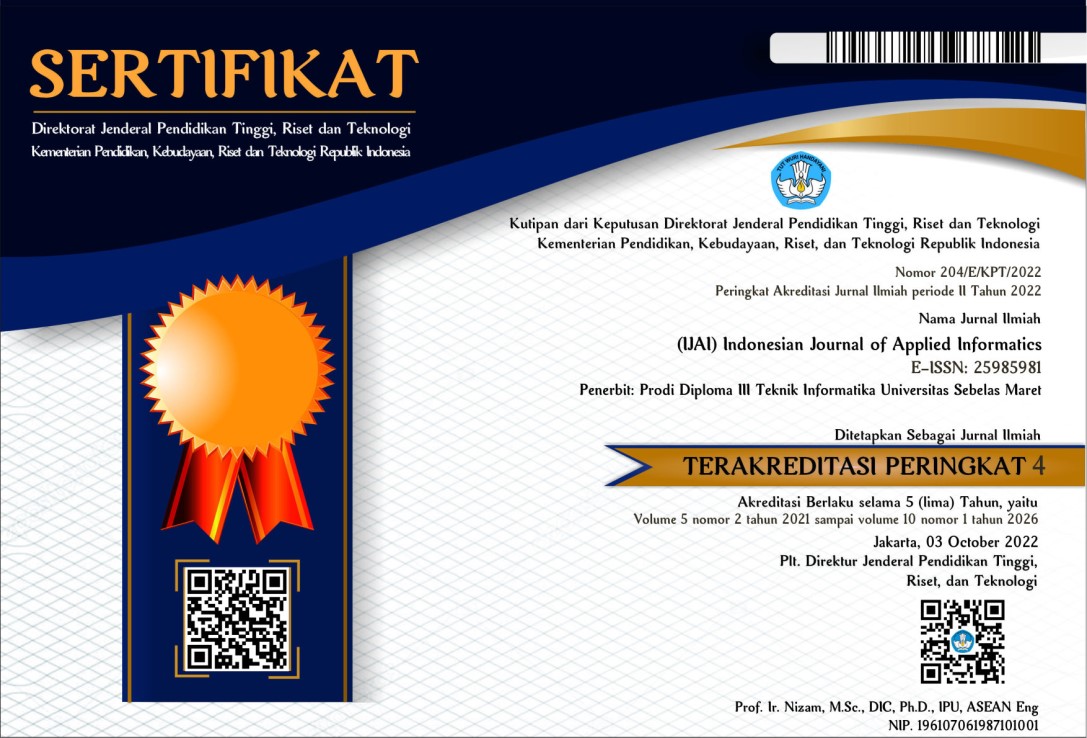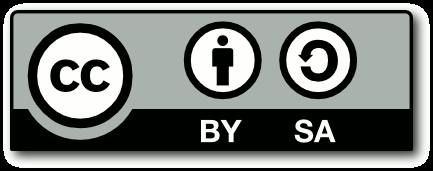Focus and Scope
Indonesian Journal of Applied Informatics publishes articles that are of significance in their respective fields whilst also contributing to the discipline of informatics as a whole and its application.
The scope of the journal include, but not limited to, the following topic areas:
1.Technopreneur
2. Cloud Computing
3. E-Commerce
4. Mobile Application
5. Information Systems Geographic Informaton System
6. Database Management
7. Web Application
8. E-Learning
9. Game Development
10. Multimedia Application
11. Software Engineering
12. Computer Network
13. Human Computer Interaction
14. Decision Support System
15. Animation
16. IoT
17. Instrumentasi
Section Policies
Articles
Peer Review Process
The submitted manuscript is first reviewed by the editors and must be free from plagiarism contents. The maximum limit of similarity is 20%. The submitted manuscript will be evaluated, whether it is suitable for our focus and scope or has a major methodological flaw.
At least two peer-reviewers will review every submitted paper. Reviewers are unaware of the authors' identity, and authors are also unaware of the identity of reviewers (double-blind review method). Reviewing process will consider novelty, objectivity, method, scientific impact, conclusion, and references. Reviewers' comments are then sent to the corresponding author for necessary actions and responses. The suggested decision will be evaluated in an editorial board meeting. Afterward, the editor will send the final decision to the corresponding author.
Publication Frequency
Journal will be publish two times a years with following timeline:
First Publication : May
Second Publication : November
Open Access Policy
This journal provides immediate fulltext open access to its content on the principle that making research freely available to the public supports a greater global exchange of knowledge. All articles published Open Access will be immediately and permanently free for everyone to read and download. Articles are freely available to both subscribers and the wider public following Creative Commons Attribution-ShareAlike (CC BY-SA). We are continuously working with our author communities to select the best choice of license options: Creative Commons Attribution-ShareAlike (CC BY-SA).
Publisher give appropriate credit (the name of the creator and attribution parties (authors detail information), a copyright notice, an open access license notice, a disclaimer notice, and a link to the material), provide a link to the license, and indicate if changes were made (Publisher indicates the modification of the material (if any) and retain an indication of previous modifications using a CrossMark Policy and information about Erratum-Corrigendum notification). If Authors/Readers/Third Parties remix, transform, or build upon the material, they must distribute their contributions under the same license as the original.
Authors/Readers/Third Parties can read, print and download, redistribute or republish the article (e.g. display in a repository), translate the article, download for text and data mining purposes, reuse portions or extracts from the article in other works, sell or re-use for commercial purposes, remix, transform, or build upon the material, they must distribute their contributions under the same license as the original Creative Commons Attribution-ShareAlike (CC BY-SA).
Archiving
This journal utilizes the LOCKSS system to create a distributed archiving system among participating libraries and permits those libraries to create permanent archives of the journal for purposes of preservation and restoration. More...
Publication Ethics and Malpractice Statement
Publication Ethics and Malpractice Statement
Indonesian Journal of Applied Informatics (e-ISSN 2598-5981) is a peer-reviewed journal published by Diploma III Informatics Engineering, Faculty of Mathematics and Natural Sciences, Universitas Sebelas Maret. This statement clarifies the ethical behaviour of all parties involved in the act of publishing an article in this journal, including the author, the chief editor, the Editorial Board, the peer-reviewer and the publisher. This statement is based on COPE’s Best Practice Guidelines for Journal Editors.
Ethical Guideline for Journal Publication
The publication of an article in a peer-reviewed IJAI journal is an essential building block in the development of a coherent and respected network of knowledge. It is a direct reflection of the quality of the work of the authors and the institutions that support them. Peer-reviewed articles support and embody the scientific method. It is, therefore, important to agree upon standards of expected ethical behavior for all parties involved in the act of publishing: the author, the journal editor, the peer reviewer, the publisher, and the society.
Universitas Sebelas Maret as the publisher of Indonesian Journal of Applied Informatics takes its duties of guardianship over all stages of publishing extremely seriously, and we recognize our ethical and other responsibilities. We are committed to ensuring that advertising, reprint or other commercial revenue has no impact or influence on editorial decisions. Also, the Universitas Sebelas Maret and Editorial Board will assist in communications with other journals and/or publishers where this is useful and necessary.
Publication decisions
The editor of Indonesian Journal of Applied Informatics is responsible for deciding which of the articles submitted to the journal should be published. The validation of the work in question and its importance to researchers and readers must always drive such decisions. The editors may be guided by the policies of the journal's editorial board and constrained by such legal requirements as shall then be in force regarding libel, copyright infringement and plagiarism. The editors may confer with other editors or reviewers in making this decision.
Fair play
An editor at any time evaluates manuscripts for their intellectual content without regard to race, gender, sexual orientation, religious belief, ethnic origin, citizenship, or political philosophy of the authors.
Confidentiality
The editor and any editorial staff must not disclose any information about a submitted manuscript to anyone other than the corresponding author, reviewers, potential reviewers, other editorial advisers, and the publisher, as appropriate.
Disclosure and conflicts of interest
Unpublished materials disclosed in a submitted manuscript must not be used in an editor's own research without the express written consent of the author.
Duties of Reviewers
Contribution to Editorial Decisions
Peer review assists the editor in making editorial decisions and through the editorial communications with the author may also assist the author in improving the paper.
Promptness
Any selected referee who feels unqualified to review the research reported in a manuscript or knows that its prompt review will be impossible should notify the editor and excuse himself from the review process.
Confidentiality
Any manuscripts received for review must be treated as confidential documents. They must not be shown to or discussed with others except as authorised by the editor.
Standards of Objectivity
Reviews should be conducted objectively. Personal criticism of the author is inappropriate. Referees should express their views clearly with supporting arguments.
Acknowledgment of Sources
Reviewers should identify relevant published work that has not been cited by the authors. Any statement that observation, derivation, or argument had been previously reported should be accompanied by the relevant citation. A reviewer should also call to the editor's attention any substantial similarity or overlap between the manuscript under consideration and any other published paper of which they have personal knowledge.
Disclosure and Conflict of Interest
Privileged information or ideas obtained through peer review must be kept confidential and not used for personal advantage. Reviewers should not consider manuscripts in which they have conflicts of interest resulting from competitive, collaborative, or other relationships or connections with any of the authors, companies, or institutions connected to the papers.
Duties of Authors
Reporting standards
Authors of reports of original research should present an accurate account of the work performed as well as an objective discussion of its significance. Underlying data should be represented accurately in the paper. A paper should contain sufficient detail and references to permit others to replicate the work. Fraudulent or knowingly inaccurate statements constitute unethical behavior and are unacceptable.
Data Access and Retention
Authors are asked to provide the raw data in connection with a paper for editorial review, and should be prepared to provide public access to such data (consistent with the ALPSP-STM Statement on Data and Databases), if practicable, and should in any event be prepared to retain such data for a reasonable time after publication.
Originality and Plagiarism
The authors should ensure that they have written entirely original works, and if the authors have used the work and/or words of others that this has been appropriately cited or quoted.
Multiple, Redundant or Concurrent Publication
An author should not, in general, publish manuscripts describing essentially the same research in more than one journal or primary publication. Submitting the same manuscript to more than one journal concurrently constitutes unethical publishing behavior and is unacceptable.
Acknowledgment of Sources
Proper acknowledgement of the work of others must always be given. Authors should cite publications that have been influential in determining the nature of the reported work.
Authorship of the Paper
Authorship should be limited to those who have made a significant contribution to the conception, design, execution, or interpretation of the reported study. All those who have made significant contributions should be listed as co-authors. Where there are others who have participated in certain substantive aspects of the research project, they should be acknowledged or listed as contributors. The corresponding author should ensure that all appropriate co-authors and no inappropriate co-authors are included on the paper and that all co-authors have seen and approved the final version of the paper and have agreed to its submission for publication.
Hazards and Human or Animal Subjects
If the work involves chemicals, human, animals, procedures or equipment that have any unusual hazards inherent in their use, the author must clearly identify these in the manuscript.
Disclosure and Conflicts of Interest
All authors should disclose in their manuscript any financial or other substantive conflicts of interest that might be construed to influence the results or interpretation of their manuscript. All sources of financial support for the project should be disclosed.
Fundamental errors in published work
When an author discovers a significant error or inaccuracy in his/her own published work, it is the author’s obligation to promptly notify the journal editor or publisher and cooperate with the editor to retract or correct the paper.
Plagiarism Policy
To ensure that the articles are free from plagiarism, Indonesian Journal of Applied Informatics (IJAI) using plagiarism software by Turnitin.com. More detail visit: https://www.turnitin.com/login_page.asp?lang=en_us
Withdraw/Retracted
IJAI Article Withdrawal and Retraction Policy
It is a fundamental principle of scholarly communication that journal editors are fully and independently responsible for deciding which submitted articles will be published. In making these decisions, editors follow the journal’s editorial board policies and are bound by applicable legal requirements concerning defamation, copyright infringement, and plagiarism. As a result, the integrity of the scholarly archive—as a permanent and historical record of article transactions—is paramount. Published articles should remain accessible, unchanged whenever possible. However, exceptional circumstances may arise where an article must be withdrawn or even removed. Such actions are not taken lightly and are reserved for extraordinary situations. In all cases, IJAI’s official archive will retain all versions of the article, including those that have been withdrawn or removed.
Article Withdrawal
Withdrawal applies to articles that represent early versions and may contain errors or were accidentally submitted more than once. In rare cases, withdrawal may also apply to violations of professional ethics, such as duplicate submission, false authorship claims, plagiarism, misuse of data, or similar issues. A “Withdrawn” article means that its content (HTML and PDF) is removed and replaced with a notice stating that the article has been withdrawn in accordance with IJAI’s policy.
Article Retraction
Retraction is used in cases of professional misconduct—such as duplicate submission, false authorship claims, plagiarism, or data misuse—and occasionally to correct errors in submission or publication. Retraction by authors or editors, often advised by members of the scholarly community, has long been a recognized practice in academia. IJAI adopts best practices for retraction as developed by various scientific bodies:
- Print Version: A retraction notice titled “Retracted: [Article Title]”, signed by the author(s) and/or editor, is published in a subsequent issue and listed in the table of contents.
- Electronic Version: A link is provided to the original article. The online article begins with a retraction notice screen, which readers must pass through to access the article. The original article remains unchanged except for a watermark on the PDF indicating “Retracted” on each page.
- The HTML version of the document is removed.
Article Removal
In extremely limited cases, legal constraints may require the removal of an article from the online database. This will only occur if the article is clearly defamatory, violates legal rights, is subject to a court order, or poses a serious health risk if acted upon. In such cases, while metadata (title and authorship) will be preserved, the text will be replaced with a screen stating that the article has been removed for legal reasons.
Article Replacement
If an article poses a serious health risk, the original author may wish to retract the flawed document and replace it with a corrected version. In this case, the retraction procedure will be followed, and the database will publish a link to the corrected and republished article along with its revision history.
This policy adheres to the guidelines set forth by COPE
(Committee on Publication Ethics).
https://publicationethics.org/node/19896







